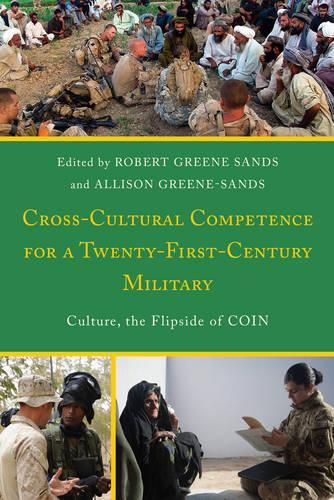
Cross-Cultural Competence for a Twenty-First-Century Military: Culture, the Flipside of COIN
(Paperback)
Publishing Details
Cross-Cultural Competence for a Twenty-First-Century Military: Culture, the Flipside of COIN
By (Author) Robert Greene Sands
Edited by Allison Greene-Sands
Bloomsbury Publishing PLC
Lexington Books
27th March 2017
United States
Classifications
Professional and Scholarly
Non Fiction
Peace studies and conflict resolution
327.174
Physical Properties
Paperback
414
Width 151mm, Height 230mm, Spine 30mm
617g
Description
Warfare in the 21stcentury is far different than warfare throughout the 19thand 20thcenturies.Conventional warfare was about kinetic force and bending an adversary by might and strength.Skills valued were those related to mastery of weapons and placing ordnance on target.Courage and valor were defined by conflict, militaries were distinct from the population, and occupation was an enduring stage of war.Contemporary warfare, besides continuing to be an exercise in military strength, is composed of missions that depend on skills to forge interpersonal relationships and build sustainable partnerships with a host of actors that once had no voice or role in conflicts duration or conclusion.Today, final victory does not conclude directly from conflict, in fact victory may be subsumed into the larger and more consuming equation of international stability.Twenty-first century warfare is about counterinsurgency and counter-terrorism through an array of strategies that foster collusion and collaboration not acquiescence.Cross-cultural competence (3C) is a suite of competencies and enablers that have been identified as critical to instill in expeditionary military and civilian personnel in the Department of Defense (DoD).Defined as a set of knowledge, skills, abilities and attitudes (KSAAs), 3C promotes effective interaction across cultural divides through exchanging ideas and meaning across cultures, facilitating effective cross-cultural interactions to develop and sustain relationships and providing a means to discern meaning from foreign and culturally different behavior.3C permeates DoD policy, doctrine, strategy and operations and is now being institutionalized in DoD military and civilian education and training. Cross-Cultural Competence for a Twenty-First-Century Military: Culture, the Flipside of COINis a volume edited by two acknowledged experts on 3C in military learning, policy and research and explores the value and necessity of 3C to developing 21stCentury warfighters.This volume features chapters by the editors and a host of multidisciplinary experts that probes all aspects of 3C, from concept to application.The message carried throughoutCross-Cultural Competence for a 21st Century Military is that contemporary and future security endeavors will be successful because winning wars ultimately rest on developing and sustaining cross-cultural relationships as much as it does on weapons and force.
Reviews
Cross-Cultural Competence for a Twenty-First-Century Military: Culture, the Flipside of COIN is a must-read for anyone engaged in national security efforts, especially for those in the military. This book provides readers with a comprehensive understanding of how and why cross-cultural competence has become critical for both national security and international stabilityand what can be done to build this capability in the Force. As thought-leaders in the cross-cultural challenges affecting todays military, Drs. Robert Greene Sands and Allison Greene-Sands have compiled the most cutting-edge work from operators, researchers, and educators that advance our collective understanding of the human capabilities necessary for success in contemporary warfare, international stability, and sustainable peace. -- Paula Caligiuri, Northeastern University
In bringing together scholars and specialists from a wide range of organizational settingsfrom academia to the armed forces, in both governmental and non-governmental settingsAllison and Robert Greene Sands have captured the rich diversity of both knowledge bases and practical applications that are essential for successful cross-cultural competence in a twenty-first -century military. -- Scott McGinnis, Defense Language Institute
These writings on cross-cultural competence are prescient, timely, and absolutely a necessary read. They bring what we know and need to know about ourselves and others into context and clarity. -- Tom Haines, Defense Intelligence Agency
Author Bio
Robert R. Greene Sands, PhD, is the director/senior research fellow at the Institute for the Study of Culture and Language at Norwich University and adjunct professor in Norwich Universitys Continuing and Graduate Studies program. Sands has extensive experience in the development of culture and regional expertise education and training programs for military and other organizations involved in stability operations. Allison Greene-Sands, PhD, is the associate director for culture for the Defense Language and National Security Office, within the Office of the Under Secretary of Defense for Personnel and Readiness. She is currently leading the implementation of a new policy that will institutionalize Cross-Cultural Competence (3C) as a core component in training and education for all military and select Department of Defense civilian personnel.
